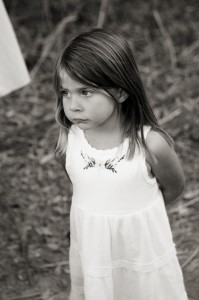The other day, my four year old daughter, Maya hears a honky tonk sounding song of Christine Kane’s and says, “Mom watch my show!” Then she pushes six of our dining room table chairs together to make a stage. She has me start the music over and she does her little head to the side, hands out with attitude, dance. I watch and smile at this sweet spunk. Then she says “Come up and dance with me, mama!”
You don’t have to ask me twice. I get up and we are dancing to a folksy rocky song when suddenly it dawns on me. Here we are dancing, I love dancing and I’m so glad my daughter loves dancing – this special language that we share that is often so hard to communicate, this joy of movement, this feeling music in your bones and heart. And then I remember how my mother loved dancing and music, and how I only really learned this after her death; how much alike we were in this way. At her funeral, my sisters spoke of how my mother would always sing songs at the top of her voice and was always dancing to her own rhythm. My heart break sthat we had this in common, and yet never knew it because we were separated when I was five, strangers to each other most of our lives. We never had this dancing on the chairs, this play we both love, this knowing how we are the same. I tell Maya “we love dancing just like your Abuela did!” and the next moment I am crying (and still dancing).
Maya looks up at me and stops, worried. I tell her it’s okay, I’m just letting my tears out. She’s not okay with it, she is so empathic, she feels it too much and so she steps down from our chair stage and goes

and lays on the couch. I think to myself “Grieving with children is complicated! How do I do this?’ and open to Guidance about what would be loving to us. I am reminded, “there is no wrong or right, just let it be, trust your heart.” I sit with my grief for a moment, then go over to her and hold her while she sobs and says “this music is just so saaaaad!” The music has changed to a more melancholy song, yet I know she means more than this, and all that’s important here is that she is able to release and be held in it.
I am reminded how important it is to embrace my grief/heartbreak without dissecting it, in the moments of the day, however, whenever they come. No matter how long ago my mother died, no matter that ‘life goes on,’ no matter that “I thought I grieved this all already!” and so on. Heartbreak is heartbreak, and when it surfaces we heal by honoring it.
I cry a little more and talk again about how we just need to let our feelings out and hold our “little girls.” She knows this concept and i see her settle into herself even as I mother her in the sweetness of the moment. But, she is still bothered about crying, still not giving herself full permission, still a little afraid of the big feeling (all too familiar to me and most people I know who are grieving). Soon, I remember our other language; song.
I begin to sing to her a modified version of the seventies song, “It’s alright to cry, crying lets the sad out of you, It’s alright to cry, it might make you feel better. Raindrops from your eyes, washing all the sad out of you, raindrops from your eyes, might make you feel better. It’s alright to feel things, though the feelings might be strange. Feelings are such real things and they change and change and change. It’s alright you know, feelings come and feelings go, it’s alright to cry…it might make you feel better.”
I sing at the top of my lungs, it feels so good to affirm this for me and her. She smiles, understanding in a new way, and because it’s time to pick up her brother Lucas from school, we head out the door. We walk up the sunny neighborhood street, past houses, past blooming flowers, past new green grasses, past our friendly mailman, holding hands and singing the song over and over. “Sing it the sad way” she says and we use sad as the emotion, then “sing it the mad way” and we change sad to mad. We are walking and we are healing. And I am drinking in the special privilege of “grieving with children.”
